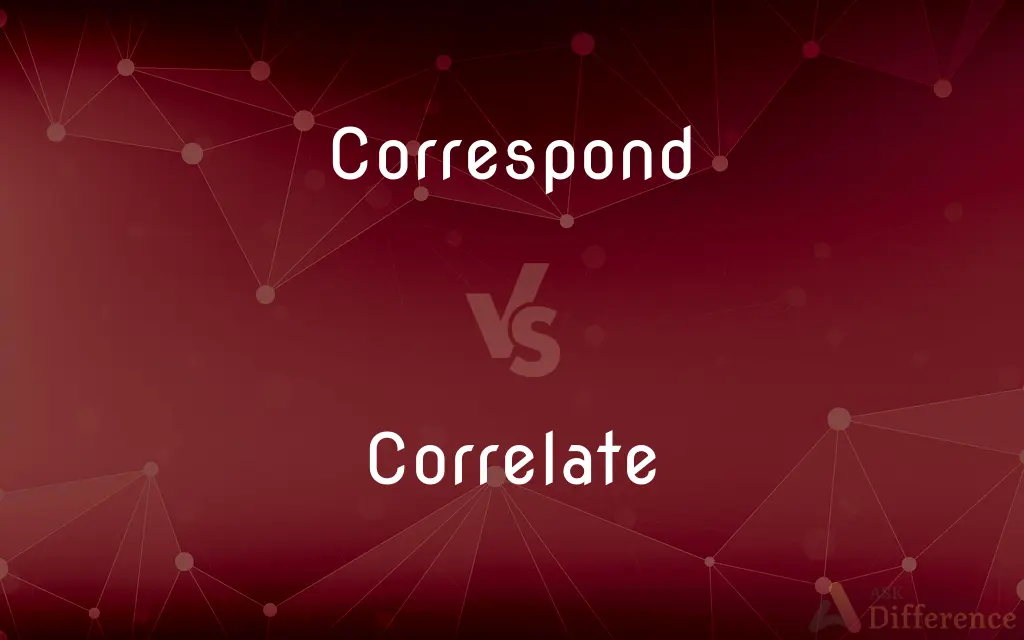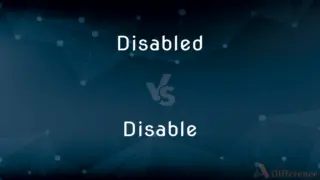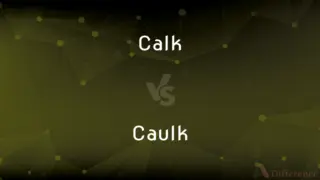Correspond vs. Correlate — What's the Difference?
By Tayyaba Rehman — Updated on November 3, 2023
Correspond means to match or be equivalent; correlate refers to a mutual relationship where one thing affects or depends on another.

Difference Between Correspond and Correlate
Table of Contents
ADVERTISEMENT
Key Differences
Correspondence implies a direct similarity or communication between two items or entities. For example, two sets of data can correspond if they show the same results under similar conditions. Correlation, however, indicates a statistical relationship where one set of data predicts or is associated with another. It does not necessarily imply one causes the other, merely that they are connected in some way.
When two things correspond, they agree or are equivalent in some noticeable way, such as design or function. It could be that one letter corresponds to another in terms of its response or that two patterns correspond in shape. When two variables correlate, on the other hand, they tend to vary together, such as temperature and ice cream sales; as temperature rises, so do the sales, but one does not cause the other.
The verb correspond can also mean to communicate by exchanging letters. This usage is completely distinct from correlation, which is used in more technical or scientific contexts to describe the degree to which two or more attributes or measurements show a tendency to vary together. Correspondence can be personal or formal, while correlation is an impersonal statistical measure.
Corresponding has another meaning in geometry, where it refers to the congruence of angles or shapes, signifying that they have the same size and form. Correlating in this context would not be applicable since it is a term used in the analysis of variables rather than fixed geometrical properties.
Lastly, corresponding parts in manufacturing are those that fit together because they are similar or complementary. In science, correlating elements of an experiment may indicate that there is a meaningful connection between them, important in establishing cause and effect, though correlation alone does not prove causation.
ADVERTISEMENT
Comparison Chart
Definition
To be equivalent or similar in character.
To have a mutual relationship or connection.
Usage in Communication
Often used to describe communication between people.
Not typically used for personal communication.
Scientific/Technical Context
Less common in statistical or scientific contexts.
Commonly used in statistics to identify relationships.
Implication
Implies a match or equivalence.
Implies a mutual relationship, not causation.
Example Usage
Two items correspond in design.
Two variables correlate statistically.
Compare with Definitions
Correspond
To be similar or equivalent in character.
The fingerprints correspond to the suspect's.
Correlate
To cause or bring into a complementary or parallel position.
Her theory correlates well with the existing evidence.
Correspond
To communicate by sending letters.
They corresponded with each other for years.
Correlate
To show correspondence or a pattern of relation.
Weather patterns correlate with tree ring data.
Correspond
To be in agreement, harmony, or conformity.
Correlate
To have a mutual relationship or connection.
Smoking and lung cancer correlate strongly.
Correspond
To be similar or equivalent in character, quantity, origin, structure, or function
English navel corresponds to Greek omphalos.
Correlate
To establish a relationship or link between.
Her symptoms correlate with a vitamin deficiency.
Correspond
To communicate by letter, usually over a period of time.
Correlate
In statistics, to vary together.
These variables correlate with each other.
Correspond
To be equivalent or similar in character, quantity, quality, origin, structure, function etc.
Correlate
To establish or demonstrate as having a correlation
Correlated drug abuse and crime.
Correspond
To exchange messages, especially by postal letter, over a period of time.
I've been corresponding with my German pen pal for three years.
Correlate
To be related by a correlation.
Correspond
(obsolete) To have sex with.
Correlate
Related by a correlation, especially having corresponding characteristics.
Correspond
To be like something else in the dimensions and arrangement of its parts; - followed by with or to; as, concurring figures correspond with each other throughout.
None of them [the forms of Sidney's sonnets] correspond to the Shakespearean type.
Correlate
Either of two correlate entities; a correlative.
Correspond
To be adapted; to be congruous; to suit; to agree; to fit; to answer; - followed by to.
Words being but empty sounds, any farther than they are signs of our ideas, we can not but assent to them as they correspond to those ideas we have, but no farther.
Correlate
(transitive) To compare things and bring them into a relation having corresponding characteristics.
Correspond
To have intercourse or communion; especially, to hold intercourse or to communicate by sending and receiving letters; - followed by with.
After having been long in indirect communication with the exiled family, he [Atterbury] began to correspond directly with the Pretender.
Correlate
(intransitive) To be related by a correlation; to be correlated.
Correspond
Be compatible, similar or consistent; coincide in their characteristics;
The two stories don't agree in many details
The handwriting checks with the signature on the check
The suspect's fingerprints don't match those on the gun
Correlate
Either of a pair of things related by a correlation; a correlative.
Correspond
Be equivalent or parallel, in mathematics
Correlate
To have reciprocal or mutual relations; to be mutually related.
Doctrine and worship correlate as theory and practice.
Correspond
Exchange messages;
My Russian pen pal and I have been corresponding for several years
Correlate
To put in relation with each other; to connect together by the disclosure of a mutual relation; as, to correlate natural phenomena.
Correspond
Take the place of or be parallel or equivalent to;
Because of the sound changes in the course of history, an 'h' in Greek stands for an 's' in Latin
Correlate
One who, or that which, stands in a reciprocal relation to something else, as father to son; a correlative.
Correspond
To match or agree with something.
The records correspond to the witness's account.
Correlate
Either of two correlated variables
Correspond
To have a close similarity; mirror or parallel.
The twins' tastes correspond in many ways.
Correlate
To bear a reciprocal or mutual relation;
Do these facts correlate?
Correspond
In geometry, to be congruent or similar in position.
The angles correspond in these two shapes.
Correlate
Bring into a mutual, complementary, or reciprocal relation;
I cannot correlate these two pieces of information
Correlate
Mutually related
Common Curiosities
Can you correspond with someone electronically?
Yes, correspondence can occur via email or other digital communication.
Can two unrelated things correspond?
They might correspond superficially but typically correspond implies some form of relevant connection.
What does 'correspondingly' mean?
It means in a way that corresponds; matching something else.
Is correlation a proof of causation?
No, correlation does not prove causation.
How do you determine if two things correlate?
Through statistical analysis that shows they vary together.
Can objects correspond?
Yes, objects can correspond if they match or fit together in design or function.
Can correlation be negative?
Yes, negative correlation means as one variable increases, the other decreases.
Is it possible for two things to correlate but not correspond?
Yes, things can be statistically related without being directly similar.
What does 'correspondent' mean?
A person who writes letters or a journalist reporting from a specific location.
Can correspondence be one-way?
It can start as one-way, but true correspondence is a two-way communication.
Do variables need to correlate perfectly?
No, correlations can be strong or weak and are rarely perfect.
What's a 'correlation coefficient'?
It's a numerical measure of the strength and direction of a correlation.
Does 'correspond to' imply ownership?
Not necessarily; it generally implies a match or equivalence.
What does 'correlate with' mean in scientific research?
It means to establish a statistical relationship between variables in a study.
Is there a verb form of 'correspondence'?
The verb form is 'correspond'.
Share Your Discovery

Previous Comparison
Disabled vs. Disable
Next Comparison
Calk vs. CaulkAuthor Spotlight
Written by
Tayyaba RehmanTayyaba Rehman is a distinguished writer, currently serving as a primary contributor to askdifference.com. As a researcher in semantics and etymology, Tayyaba's passion for the complexity of languages and their distinctions has found a perfect home on the platform. Tayyaba delves into the intricacies of language, distinguishing between commonly confused words and phrases, thereby providing clarity for readers worldwide.














































